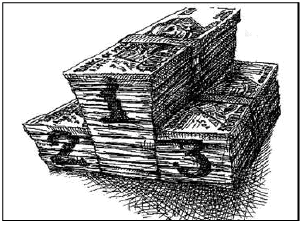Political Science Mock Test- 2 - Class 9 MCQ
30 Questions MCQ Test Subject-wise Mock Test for Class 9 2025 - Political Science Mock Test- 2
The courts which function under the supervision and orders of the High Court are known as Subordinate Courts.
Assertion (A) : For Lok Sabha elections, the country is divided into 543 constituencies.
Reason (r) : The representative elected from each constituency is called a Member of Parliament or an MP.
Study the given picture carefully:

This picture is related to which of the following?
Whom does the President appoint as the Prime Minister?
Read the source given below and answer the following questions:
Like South Africa, India’s Constitution was also drawn up under very difficult circumstances. The making of the Constitution for a huge and diverse country like India was not an easy affair. At that time the people of India were emerging from the status of subjects to that of citizens. The country was born through a partition on the basis of religious differences. This was a traumatic experience for the people of India and Pakistan. At least ten lakh people were killed on both sides of the border in partition related violence. There was another problem. The British had left it to the rulers of the princely states to decide whether they wanted to merge with India or with Pakistan or remain independent. The merger of these princely states was a difficult and uncertain task. When the constitution was being written, the future of the country did not look as secure as it does today. The makers of the constitution had anxieties about the present and the future of the country.
Q. At that time the country was going through a partition on the basis of ............... differences.
Read the source given below and answer the following questions:
Like South Africa, India’s Constitution was also drawn up under very difficult circumstances. The making of the Constitution for a huge and diverse country like India was not an easy affair. At that time the people of India were emerging from the status of subjects to that of citizens. The country was born through a partition on the basis of religious differences. This was a traumatic experience for the people of India and Pakistan. At least ten lakh people were killed on both sides of the border in partition related violence. There was another problem. The British had left it to the rulers of the princely states to decide whether they wanted to merge with India or with Pakistan or remain independent. The merger of these princely states was a difficult and uncertain task. When the constitution was being written, the future of the country did not look as secure as it does today. The makers of the constitution had anxieties about the present and the future of the country.
Q. Why did the makers of the constitution have anxieties when the constitution was being written?
What is the tenure of office of the Prime Minister?
An assembly of people’s representatives with the power to enact laws for a country is called a/an Legislature.
Why does the political executive have more powers than the permanent executive?
Which of these choices are made by voters in elections to a representative democracy?
Which of these is not a condition of a democratic election?
What did the black population want in the new Constitution?
What did the white minority want from the new Constitution?
A democratic government has to respect some rules after winning the elections. Which of these points is not a part of those rules?
What is the name of the body which framed the Constitution of India?
Can the Houses of Parliament be dissolved? Select the correct option.
What does the Supreme Court say over the Parliament’s power of amendment of the Constitution?
When did Zimbabwe attain independence and from whom?
Which party has ruled Zimbabwe since its independence and who is its ruler?
Which of these statements about the relationship between democracy and rights is more valid?
Which among the following is not a feature of the Indian Constitution?
Which of these was the most salient underlying conflict in the making of a democratic constitution in South Africa?
Which of these is a provision that a democratic constitution does not have ?


















